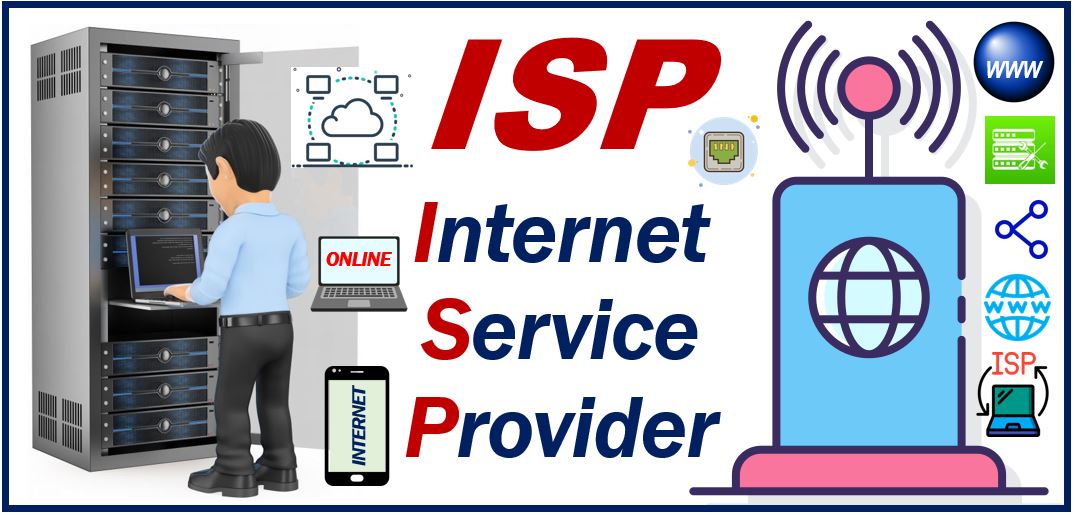What is an ISP? Definition and examples
The letters ISP stand for Internet Service Provider, which is an industry term for a company that provides home users, businesses, government departments, educational institutions, non-profit organizations, healthcare facilities, and other entities with Internet access.
Typically, this access is from a computer. Anybody who is talking about the Internet and mentions their provider is referring to their ISP.
Other meanings
ISP also stands for In System Programming, International Specialty Products, Information Service Provider, Innovative Service Program, and Iron Sulfur Protein, among others. In this article, we shall focus on its meaning in the world of the Internet.

ISP gives you access
Without an ISP, it would not be possible to access your social medial platform, shop online, or even read this article. Specific telecom networking systems and routing equipment are required to get online. With an ISP, you get access to those networks.
Investopedia has the following definition of the term:
“The term internet service provider (ISP) refers to a company that provides access to the internet to both personal and business customers. ISPs make it possible for their customers to surf the web, shop online, conduct business, and connect with family and friends—all for a fee.”
It is a fairly new term, having only been around for about three decades (since 1990).
An ISP may offer several services
Most Internet Service Providers today also have other facilities in their range of products for customers. They may, for example, offer domain registrations, web hosting, browser packages, telephone connections, data communication access, and email services.
Most ISPs provide customer support and technical assistance, often 24 hours a day, to ensure a seamless internet experience.
-
Cloud computing
Cloud computing refers to the delivery of computing services over the Internet. Rather than working on, for example, files that are stored on your computer’s hard disk, they are kept in a remote computer. We refer to this remote computer as the cloud.
This means that you can work from anywhere with any laptop, desktop, tablet, or smartphone, as long as you have an internet connection.
Explain That Stuff says the following about cloud computing:
“Cloud computing means that instead of all the computer hardware and software you’re using sitting on your desktop, or somewhere inside your company’s network, it’s provided for you as a service by another company and accessed over the Internet, usually in a completely seamless way.”
“Exactly where the hardware and software is located and how it all works doesn’t matter to you, the user—it’s just somewhere up in the nebulous “cloud” that the Internet represents.”
Users pay a fee
Most Internet Service Providers charge a fee of between $30 to $100 each month – typically for unlimited access. Before committing yourself to a provider, make sure you know what the total monthly rate is, i.e., read the small print carefully.
Customers pay for just one Internet connection. They can then set up a network in their homes, schools, or offices with other tablets, smartphones, computers, TVs, and various smart devices. Smart, in this context, refers to gadgets or devices that are able to connect to the Internet. Computer software, some with AI, makes them intelligent (AI – Artificial Intelligence).
ISPs also play a crucial role in cybersecurity, offering various protective measures to guard against online threats.
How do ISPs work?
To connect to your provider, you must have an active account and a modem. Your modem connects with your ISP via the telephone line or a cable outlet.
When the ISP has verified your account, it assigns an IP address to your modem. You have Internet connection as soon as your modem has an IP address.
According to TechTerms:
“You can use a router (which may be a separate device or built into the modem) to connect multiple devices to the Internet. Since each device is routed through the same modem, they will all share the same public IP address assigned by the ISP.”
Top 10 ISPs Worldwide
Here are the top ten ISPs globally, plus the speeds they offer and fees they charge, according to TheNextTech:
• Ziply Fiber
100-10,0000Mbps, $40 – $300 per month
• AT&T Fiber
300 – 5,000Mbps, $55 – $250 per month
• Google Fiber
1,000 – 2,000Mbps, $70 – $100 per month
• Verizon Fios
300 – 2,000Mbps, $50 – $120 per month
• Xfinity
75 – 2,000Mbps, $20 – $120 per month
• WideOpenWest (WOW!)
100-1,200Mbps, $20 – $95 per month
• Spectrum
300 – 1,000Mbps, $30 – $90 per month
• Quantum Fiber
10 – 940Mbps, $50 – $75 per month
• Viasat
12 – 150Mbps, $70 – $300 per month
• HughesNet
15 – 50Mbps. $50 – $150 per month
Educational Video – What’s an ISP or Internet Service Provider?
This educational video, from our sister channel on YouTube – Marketing Business Network, explains what ‘ISP’ means using simple and easy-to-understand language and examples.

